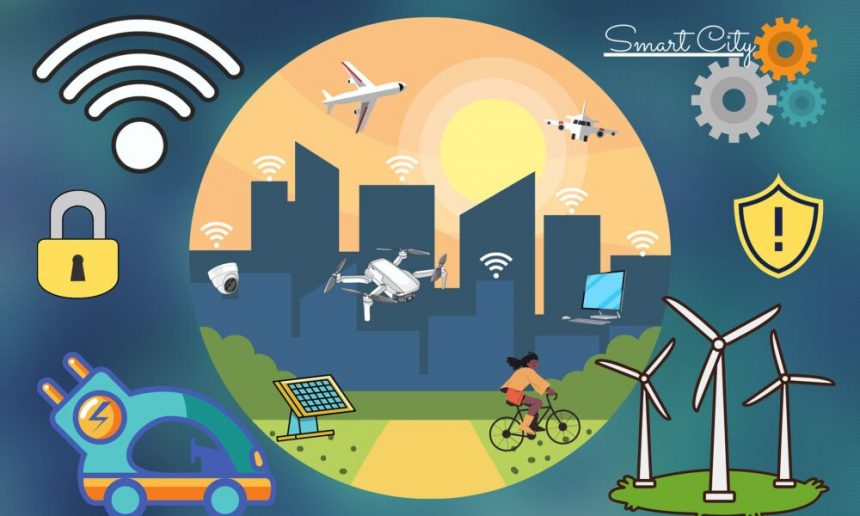Modern travel has evolved significantly and is now at the pinnacle of on-demand scooter rentals and AI-powered rideshare services. Technology is transforming the rental industry with IoT sensors, predictive maintenance, fleet electrification, mobile app bookings, and more.
In this blog, we will explore smart mobility trends shaping the rental industry and consider their impacts on providers and users alike.
What Is Smart Mobility and Why Does It Matter Today?
Smart mobility is the result of adopting new technologies across various sectors and seamlessly integrates information technology with transportation. Smart mobility has a focus on environmental sustainability while addressing a plethora of evolving data, user demands, and requirements aimed toward effective movement.
With rapid population growth in urban centers, there is a higher need for orderly transport systems that accommodate the fast-paced lifestyle that comes with emerging digital tools. The transportation experience is enhanced with real-time GPS mobile tracking, AI algorithms, and connected vehicles.
The Evolution from Traditional Transport to Smart Mobility
The move away from traditional transport to smart mobility is striking, and not just for its speed. Taxis and public transport are now being replaced by ridesharing, e-scooters, contactless car rentals, and even self-driving shuttles. Never before has traveling been so easy.
Consumer shifts prompted by Uber, Zipcar, and Lime have equally driven the growth of these companies. Besides mobility and ease of use, they have also brought flexibility. As long as there are advances in technology, rental services will have to adapt quickly or face extinction.
Key Drivers of Smart Mobility in 2025
Smart mobility will be affected by the trends outlined below for a long time to come:
- The expansion of city regions is coupled with chronically worsening traffic jams. The congestion, gridlocks, and lack of parking spaces face unprecedented challenges. Car sharing, along with e-scooters and other forms of micro-mobility, can reduce the number of vehicles and increase road efficiency.
- The recent worrying trend of global warming has pushed almost everyone to adopt eco-friendly habits. Meeting business targets has become easier for rental agencies as they now offer electric vehicles, hybrids, and carbon offset policies.
- Quick service delivery is a salient feature of the modern business landscape. Customers expect AI-driven customer support, effortless payments, and keyless access to cars.
The Role of Technology in Redefining Rentals
The role of technology can be viewed as an evolution. In the rental sector, technology has progressed from being an additional feature to a leading force of transformation. Today, the Internet of Things (IoT), Artificial Intelligence (AI), and mobile applications are revolutionizing the interaction frameworks between clients and rental companies as well as improving the operational and user experience. These technologies enable smarter, safer, and rental ecosystems that operate more smoothly.
IoT, GPS, and Telematics in Rental Services
The presence of telematics IoT, together with GPS-enabled devices, is ushering in unparalleled advancement within the rental service sector in terms of fleet visibility and control. They assist in tracking vehicle locations and provide information technology intelligence concerning location, utilization, and driver behavior.
Operators can leverage remote diagnostics to pinpoint problems before they escalate to critical levels, effectively preventing extended vehicle downtimes and optimally extending the lifespan of the vehicle’s services. Moreover, built-in sensors and GPS systems help reduce the chances of theft or misuse by alerting operators during unauthorized activities or when suspicious movements happen.
Mobile Apps and Digital Booking Systems
Clients within the rental ecosystem have become accustomed to mobile-centric services. Contemporary mobile applications, as well as digital booking systems, facilitate reservations, payments, vehicle unlocking, and even returns, all without requiring counter or agent interactions.
Contactless access to vehicles is now a must. Users can verify their identity and unlock vehicles with smartphones within seconds. This compliments post-pandemic safety protocols. Other enhancements consolidating the rental experience include real-time availability, instant pricing, and flexible booking windows.
Automation, AI, and Predictive Maintenance
Through automation and AI, the profit and productivity potential for rental companies is being harnessed. At this very moment, a customer service AI chatbot is able to handle customer interactions, assist with bookings, and resolve issues 24/7. This enables human agents to focus on more complex problems.
In the rental industry, an AI-based algorithm that analyzes data on vehicle usage and predicts servicing automates maintenance scheduling. Such advanced scheduling not only eliminates costly repairs but also ensures that fleets are optimally serviced and always ready for use.
In addition, AI-powered predictive analytics enable rental companies to maintain a competitive edge over their rivals through optimized control of inventory, pricing, demand-based costing, route configuration, and even forecasting emerging growth trends within the sector.
How Smart Mobility Is Impacting the Bike Rental Industry
Just like the car rental business, smart mobility has reached the bike rental business. As cities work toward smart mobility goals, smart bike rentals can solve issues within the urban context. In this case, the bike rental industry has a chance to lead the mobility revolution by adopting technology, enhancing customer service, and integrating planning with bike rental services.
The Rise of Bike-Sharing and Micro-Mobility
Severe congestion and the scarcity of parking spaces are accelerating the adoption of bike-sharing and other micro-mobility services, particularly in urban areas. Commuters are now switching to eco-friendly options like dockless bikes, e-bikes, and scooters for short-distance travel.
With mobile applications, shared bikes are more accessible and rental processes have become frictionless. As users can release shared bikes at their destinations, they no longer need to worry about bike ownership. This is transforming lifestyles positively and reducing car dependency.
Why the Bike Rental Industry Needs Specialized Software
A bike rental business now is much more than just having bikes for customers. In the context of smart mobility, operators need to manage fleets, users, bookings, maintenance schedules, and other relevant data in real time.
Rental operators can capitalize on custom rental software to monitor the location, condition, and rental status of each bike in real time. Advanced routing and usage analytics provide insights into customer behavior, peak demand periods, and service area requirements, thus fostering growth. Keying in mobile-friendly interfaces also makes the locating, unlocking, and renting of bikes effortless.
Explore the Benefits of Using Rental Booking Softwares
For operators, the core systems go beyond the basics. They need dedicated and advanced solutions to fulfill their requirements. Streamlining business processes makes managing them much easier. Smart Bike Rental Software enhances these processes by providing customer relationship aides and inventory control. Such systems usually incorporate GPS, automation for payments, real-time updates, and mobile applications.
In the emerging mobility ecosystem, modern tech booking information systems offer additional insights, improve user experiences, and strategically position businesses for sustainable growth.
Other Industries Being Transformed by Smart Rentals
The effects of smart mobility go beyond bicycles and cars. It is changing numerous sectors from automotive to outdoor recreation as rental businesses modify their operating models to improve convenience, safety, and user satisfaction. Businesses in almost all sectors are using smart technologies for better access and automation.
Car Rental Services with Connected Cars
Car rental services are being modernized with connected car technology. Electric vehicles like Teslas are increasingly popular among younger renters because of their onboard technology. They provide eco-friendly travel options and ease of use. These cars can be unlocked, started, and even returned using an app.
This enables smart cars to fulfill the expectations of users as well. Automated renter appreciation features such as intelligent navigation, automated climate control, and driver profile recall make the trip more enjoyable. On the other hand, fleet operators gain by improved management provided by connected smart vehicles that offer GPS tracking, remote fleet immobilization, and real-time diagnostics. With these technologies, connected smart vehicles provide better control and security while enhancing efficient operations.
Equipment and Leisure Rentals Going Digital
The smart rental trend is changing how people rent leisure and outdoor equipment. Current trends include paddleboard rentals by the beach as well as ski and camping gear rentals in the mountains, where face-to-face counters have been replaced with digital kiosks.
Staff-less rental hubs improve service quality, and customers are able to scan gear, unlock it, and return it through smart lockers or kiosks. These automated customer interactions around the clock save time and optimize stock management.
Benefits of Embracing Smart Mobility for Rental Businesses
Smart mobility is more than just a technology. It forms a basis for a more flexible business framework. For rental companies in any industry, adopting smart mobility means streamlined processes, operational efficiency, and greater customer satisfaction. For the rental market, whether it be bikes, cars, or kayaks, competition is now easier to navigate.
Increased Operational Efficiency
Among the many advances in any given business, operational smart mobility stands out as one of the most transformative. Modern businesses are able to automate processes and streamline operations thanks to the growing use of IoT devices, cloud solutions, and automated systems. A lowered need for manual labor leads to quicker servicing, fewer mistakes, and a greater capacity to nurture growth.
Rental managers have access to centralized dashboards that provide real-time analytics on bookings, equipment, vehicle usage, maintenance schedules, and even customer interactions. All these insights can be accessed at once, offering powerful aggregation. Resource allocation optimization is thus possible, allowing scaling without a proportional increase in staffing or workload.
Improved Customer Experience
Frictionless mobility offers convenience, which customers cherish the most. From a consumer standpoint, mobile applications, self-service rentals, and instant booking systems smoothen processes dramatically. There is no waiting in long lines, no dealing with time-consuming paperwork, and absolutely no uncertainty regarding availability.
Smart systems are able to send offers and loyalty rewards tailored to individual users, as well as automate feedback such as rental follow-up surveys. These tech-powered communications strengthen relationships with customers, increasing overall satisfaction.
Eco-Friendly and Sustainable Impact
In addition to providing greater value, smart mobility is advantageous to the environment as well. Using advanced data analytics helps rental companies manage fleet bookings and eliminate idling, reduce unproductive hours, and schedule low-emission fueling, which subsequently lowers both fuel costs and emissions.
Rental firms contribute towards more strategic sustainability goals like managing traffic and enhancing air quality in urban centers by operating shared electric or low-emission fleets. Such programs also support new city-level projects aimed at sustainable mobility and carbon neutrality, which may create new alliances and grant possibilities.
Final Thoughts: Why Tech-Forward Rentals Will Lead the Future
The concept of smart mobility is here to stay. It marks an important shift in how people engage with movement, rentals, and services. Whether it be cars, bikes, or leisure equipment, rentals have undergone a transformation due to technologically driven efficiencies. Early adopters have the greatest potential to differentiate themselves in the post-adoption phase.
Every stage of the rental process benefits from smart mobility. IoT tracking, mobile apps for booking, and AI automation are examples of advanced tech solutions that can eliminate inefficiencies, improve customer satisfaction, and create more competitive business environments.
Listening to the business needs of the users and applying the right technology is crucial for achieving the objectives. For example, managing a bike rental program for an entire city can be streamlined by employing gear rental specialized software or bike rental smart software, thus delivering long-term value.
Bicycle rentals and gear rentals businesses need to embrace this new shift as the future of rentals offers deep automation, top-notch connectivity, and provides customers with unparalleled value.








